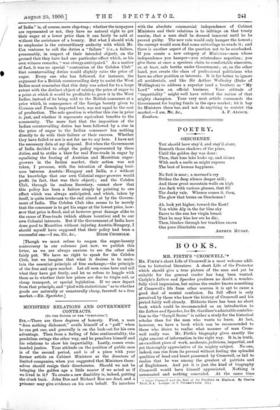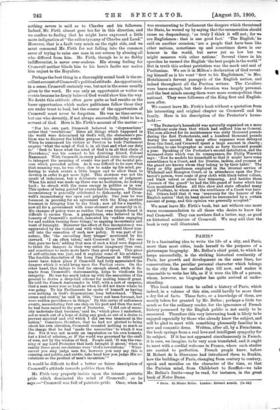BOOKS.
MR. FIRTH'S "CROMWELL."*
MR. FIRTH'S short Life of Cromwell is a most welcome addi- tion to historical literature. A short Life of the Protector which should give a true picture of the man and yet be suitable for the general reader has long been wanted. Carlyle's Letters and Speeches produces no doubt a wonder. fully vivid impression, but unless the reader knows something of Cromwell's life from other sources it is apt to cause a good deal of mental confusion. Its full effect is only perceived by those who know the history of Cromwell and his period fairly well already. Hitherto there has been no short book which could be recommended as an introduction to the Letters and Speeches, for Dr. Gardiner's admirable contribu- tion to the "Goupil Series" is rather a study for the historical scholar than for the man who wants to learn. At last, however, we have a book which can be recommended to those who desire to realise what manner of man Crom- well really was. Mr. Firth's biography gives exactly the right amount of information in the right way. It is, in truth, an excellent piece of work, moderate, judicious, impartial, and yet thoroughly appreciative of its mighty subject. No one, indeed, can rise from its perusal without feeling the splendid qualities of head and heart possessed by Cromwell, or fail to realise that he was among the greatest of patriots and of Englishmen. And yet it is just the kind of biography Cromwell would have himself appreciated. Nothing is extenuated and nothing concealed. At the same time Oliver Cromwell and the Rule of the Puritans In Englu,ni. By Charles Firth, M.A. London : U. P. Ptah= a Sous. [Ss.]
nothing severe is said as to Charles and his followers. Indeed, Mr. Firth almost goes too far in this direction, and we confess to feeling that he might have expressed a little more indignation at " the sullen tyranny of Charles and Laud." However, that is a fault very much on the right side, and we must commend Mr. Firth for not falling into the common error of trying to raise one man in our esteem by abusing all who differed from him. Mr. Firth, though he is no flabby indifferentist, is never over-zealous. His strong feeling for Cromwell neither blinds him to his hero's faults nor makes him unjust to the Royalists.
Perhaps the best thing in a thoroughly sound book is the ex- cellent account of Cromwell's political attitude. An opportunist, in a sense, Cromwell certainly was, but not in the sense usually given to the word. He was only an opportunist or waiter on events because he firmly believed God would show him the way. No doubt this attitude often gave quite as bad results as the baser opportunism which makes politicians follow those they are under trust to lead, but the source of the opportunism of Cromwell must never be forgotten. He was no time-server, but one who devoutly, if not always successfully, tried to be a servant of God. Here is Mr. Firth's account of the matter :-- " For his own part, Cromwell believed in ' dispensations rather that 'revelations.' Since all things which happened in the world were determined by God's will, the statesman's pro- blem was to discover the hidden purpose which underlay events When he announced his victory at Preston he bade Parliament enquire 'what the mind of God is in all that and what our duty
is.' Seek to know what the mind of God is in all that chain of Providence,' was his counsel to his doubting friend, Colonel Hammond. With Cromwell, in every political crisis this attempt
to interpret the meaning of events was part of the mental pro- cess which preceded action. As it was difficult to be sure what that meaning was, he was often slow to make up his mind, pre ferring to watch events a little longer and to allow them to develop in order to get more light. This slowness was not the result of indecision, but a deliberate suspension of judgment.
When his mind was made up there was no hesitation, no looking back ; be struck with the same energy in politics as in war.
This system of being guided by events had its dangers. Political inconsistency is generally attributed to dishonesty, and Crom- well's inconsistency was open and palpable. One year he was foremost in pressing for an agreement with the King, another foremost in bringing him to the block ; now all for a republic, now all for a government with some element of monarchy in it.
His changes of policy were so sudden that even friends found it difficult to excuse them. A pamphleteer, who believed in the honesty of Cromwell's motives, lamented his sudden engaging for and sudden turning from things,' as arguing inconstancy and want of foresight. Moreover the effect of this inconsistency was aggravated by the violent zeal with which Cromwell threw him- self into the execution of each new policy. It was part of his nature, like 'the exceeding fiery temper' mentioned by his steward. I am often taken,' said Cromwell in 1647, for one that goes too fast,' adding that men of such a kind were disposed to think the dangers in their way rather imaginary than real, and sometimes to make more haste than good speed. This piece of self-criticism was just, and it explains some of his mistakes.
The forcible dissolution of the Long Parliament in 1653 would never have taken place if Cromwell had fully appreciated the
dangers which it would bring upon the Puritan cause. On the other hand, this failure to look far enough ahead, while it de- tracts from Cromwell's statesmanship, helps to vindicate his integrity. He was too much taken up with the necessities of the present to devise a deep-laid scheme for making himself great. He told the French Ambassador in 1647, with a sort of surprise, that a man never rose so high as when he did not know where he was going. To his Parliaments he spoke of himself as having seen nothing in God's dispensations long beforehand. These issues and events,' he said in 1656, have not been forecast, but were sudden providences in things.' By this series of unforeseen events, necessitating first one step on his part and then the next, he had been raised to the post of Protector. I did out of neces- sity undertake that business,' said he, which place I undertook, not so much out of a hope of doing any good, as out of a desire to prevent mischief and evil which I did see was imminent in the nation' Conscious, therefore, that he had not plotted to bring about his own elevation, Cromwell resented nothing so much as the charge that he had made the necessities' to which it was due. For it was not merely an imputation on his own honesty, but a kind of atheism, as if the world was governed by the craft of men, not by the wisdom of God. People said, 'It was the cun- ning of my Lord Protector that bath brought it about,' when in reality these great revolutions were' God's revolutions.' What- soever you may judge men for, however you may say this is cunning, and politic, and subtle, take heed how you judge His re- volutions as the product of men's invention. "
It would be difficult to find a better or fairer description of Cromwell's attitude towards politics than this.
Mr. Firth very properly insists upon the intense patriotic pride which dominated the mind of Cromwell ; as he says :—" Cromwell was full of patriotic pride. Once, when he was enumerating to Parliament the dangers which threatened the State, he wound up by saying that the enumeration should cause no despondency, as truly I think it will not; for we are Englishmen - that is one good fact." The English,' he said on another occasion, are a people that have been like other nations, sometimes up and sometimes down in our honour in the world, but never yet so low but we might measure with other nations.' Several times in his speeches he termed the English 'the best people in the world.'" But in truth this ardent patriotism was the mark and seal of Puritanism. We see it in Milton's declaration of God reveal- ing himself as is his wont " first to his Englishmen," in Mrs. Hutchinson's fervent panegyric of the English nation, and indeed throughout all the Puritan writers. The Cavaliers were brave enough, but their devotion was largely personal, and the best minds among them were more cosmopolitan than national. They were followers of the King first and English- men after.
We cannot leave Mr. Firth's book without a quotation from his interesting and original chapter on Cromwell and his family. Here is his description of the Protector's house- hold :—
" The Protector's household was naturally organised on a more magnificent scale than that which had sufficed him as General. The sum allowed for its maintenance was sixty thousand pounds during the first Protectorate, and a hundred thousand pounds during the second. But many other expenses were defrayed from this fund, and Cromwell spent a large amount in charity ; according to one biographer as much as forty thousand pounds a year. Speaking of the Protector's second installation, and the increased state which was its consequence, Sir Philip Warwick says : Now he models his household so that it might have some resemblance to a Court, and his liveries, lackies, and yeomen of the guard are known whom they belong to by their habit.' The forty or fifty gentlemen employed in the internal service of Whitehall and Hampton Court, or in attendance upon the Pro- tector's person, wore coats of grey cloth with black velvet collars, and black velvet or silver lace trimming. And besides these ' yeomen of the guard' he had the life-guard of horse which has been mentioned before. All this show and state offended many rigid Puritans, to whom even the semblance of a Court was hate- ful. Others held that it was ' necessary for the honour of the English nation' that its head should be surrounded by a certain amount of pomp, and this opinion was generally accepted."
We must leave Mr. Firth's book, but not without one more warm recommendation to all those who desire to know the real Cromwell. They can nowhere find a better, nay, as good an historical miniature of Cromwell. We may add that the book is very well illustrated.



































 Previous page
Previous page